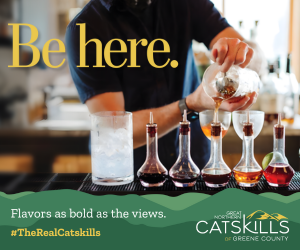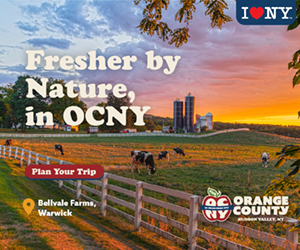JUST A FEW WEEKS AGO, the idea of sitting among the vines with a group of friends and a flight of wine and a plate of cheese seemed like a cherished memory. For the wine and craft beverage industry whose cornerstone is socialization and gathering, persevering through the coronavirus required businesses to change course until the day when that memory could become a reality again.
Covid-19 hit just as the tourism season was ramping up. There would be no business from tour buses, bachelorette parties, weddings, hosted events, or general patronage from locals and travelers. Restaurants and bars that normally bought and sold local craft beverages were closed or had temporarily ceased to order product.
Local businesses had a choice to pivot or perish, and with the help of a supportive community, many Hudson Valley craft beverage producers were able to chug along like the little region that could. Producers switched tracks in innovative and smart ways to stay afloat through the pandemic—from ramping up pickup and delivery services so they could keep staff employed; to making hand sanitizer for front line workers and customers; to creatively packaging cocktail-to-go kits; or simply keeping customers happy with new product releases.
Delivering a Message of Hope
Many consumers opted to patronize their favorite makers and growers and take advantage of pickup and delivery, rather than shop in a generic liquor store or faceless online corporation. That kind of esprit de corps is what has kept many beloved local businesses afloat.
“Initially, the shutdown threw us for a loop but we got creative and offered our customers things they loved most about visiting us, and came up with a way that they could take a piece of Nostrano home with them,” says Kayleigh Bozzo, Tasting Room Manager and Event Director of Nostrano Vineyards. “We quickly set up an online storefront where we’ve been offering all of our wines for purchase with curbside pickup, local delivery, and free shipping.”
Producers switched tracks in innovative and smart ways to stay afloat through the pandemic.
One thing is for sure, people are still imbibing. Even more so— studies say the average consumer is drinking more since the shutdown. E-commerce retail sales have doubled versus one year ago (+234%) from the beginning of March until April 18, 2020, according to Nielson. Many of the Hudson Valley’s producers put work into their online platform when they previously relied on tasting room sales. Contactless pickup and delivery became a must.
New owners of Glorie Farm Winery, Jacqui Ferrari Heavens and Dan Heavens, barely had a chance to settle in before coming to terms with the current reality. “The shutdowns began less than two months after we became owners of Glorie,” says Ferrari Heavens. “Prior to that, our business was almost exclusively [based on] tastings at the winery. Our plan for this spring was to introduce live music, food vendors, and to add private tour experiences, which became impossible, so we switched to focusing on curbside pickups and deliveries.”
Delivery was also a way to keep staff member’s jobs secure. Peter Voelker, co-owner of Helderberg Meadworks owes staying afloat without the need for loans or layoffs to New York’s Governor Andrew Cuomo when he allowed beverage producers to deliver to residents. “Deliveries are an opportunity that is hard to pass up when people are being encouraged to stay home. Ashleigh Ellis, who’s been delivering, got to be a master at setting up an efficient delivery route,” says Voelker. “We also introduced a new mead, Loki’s Lure, via a virtual release and tasting, which has helped promote our delivery and pickups.”
In addition to local delivery, some merchants began to offer fun and safe ways to encourage pickup. “Our staff has been great adapting to the stress and taking on more responsibilities,” says Derek Grout, owner and distiller of Harvest Spirits. “We have expanded our online sales and have a concession trailer in the parking lot along with a food truck.”
Using Available Resources to Benefit Others
In many ways, the beverage industry as a whole would be in dire straits if government agencies didn’t allow for new practices, such as using equipment and product to make hand sanitizers for sale and donation to front line workers. “As soon as the TTB and FDA allowed distillers to make hand sanitizer on March 17, we immediately pivoted to produce hand sanitizer from our inventory of apple vodka,” says Grout. “We remained at full employment throughout the pandemic to meet the demand for hand sanitizer.”

The lack of sanitizer for sale or donation during the crisis was apparent, and distillers came to the rescue. “Originally we made the sanitizer to fill a need, donating and selling exclusively to hospitals and first responders,” says Richard Scoffier, consultant at Black Dirt Bourbon Barn. “As our volume went up and more sanitizer made it to the market we were able to open those sales up to the public.”
Tuthilltown Spirits, which has global reach and affiliates overseas, donated goods across the pond as well as in the Hudson Valley. “We shifted to producing, packaging, and distributing hand sanitizer and donating to those on the front lines, as well as families and community-oriented causes throughout New York,” says head of operations, Derek Bain. “William Grant & Sons, the parent company of Hudson Whiskey and owners of Tuthilltown Spirits, are also mass-producing ethanol for a range of hand sanitizer manufacturers at the distilleries at Girvan (Scotland) and Tullamore (Ireland), donating 100% of any profits back to support the community.”
Batch Cocktails and Custom To-Go Bundles
In an effort to offer the tasting room experience at home, producers have gotten creative with their marketing. The past few months in lockdown overlapped with many holidays that typically include a celebratory beverage, such as St. Patrick’s Day, Cinco de Mayo, Mother’s Day, and Memorial Day, as well as general birthdays, graduations, and anniversaries. Producers came up with innovative gift packages to be delivered or safely picked up for these occasions.

Many realized the popularity in these baskets and bundles, and made it part of their online shop. “In addition to wines we’ve been selling online,” says Bozzo, “we decided to offer cheese and charcuterie boards that are packaged in old farm boxes once used by [proprietor] Nic’s grandfather.”
Some businesses joined forces to make a one-stop-shop for local bounties. When she could no longer welcome guests or brunch-goers, Anna Frumes, owner of The Borland House Inn in Montgomery, made a smart decision. In addition to offering to-go meals like many other restaurants, she reached out to local farms to make a weekly farm basket subscription called Suzie’s Farm Wagon that includes produce, local cheese, baked goods, dry goods, and meat. The option to add bottlings from Whitecliff Vineyard & Winery, Newburgh Brewery, and Metal House Cider made it all the more exciting for customers when the goodies arrived.
“Since the laws changed we had the opportunity to do something that we have never been able to do, or would be quite complicated to get approved.”
– Richard Scoffier, consultant, Black Dirt Bourbon Barn
Without the use of social media, these efforts would be fruitless. Locals keep tabs on new ways to enjoy their standbys and learn about new releases. “We have been using social media to feature our mixed cases,” says Tom Ryan, hospitality consultant at Milea Estate Vineyard. “We offer a few different combos to choose from that mix and match our wines, ciders, and gin, at a value.”
Batch cocktails are another way distilleries are creatively adapting. “We sell cocktails to-go from our concession trailer in eight-ounce plastic containers,” says Grout. “With the food truck on the grounds nearby, it’s an easy way to grab some food and a professionally-made cocktail.”
“Since the laws changed we had the opportunity to do something that we have never been able to do, or would be quite complicated to get approved,” says Scoffier. “We are currently offering a barrel-aged Manhattan, using all of our Black Dirt whiskeys as well as vermouth, bitters, and our American Fruits sour cherry cordial. Then there’s the barrel-aged ‘Faux-Groni’ where we replaced Campari with Peychaud’s Bitters and our cherry cordial. Lastly, the strawberry lemonade has been flying off the shelves. It’s made with our newest gin, Gin Pig, fresh strawberry syrup, and lemons.”
Thoughts on Re-Opening
With shelter-in-place restrictions now lifted, a new phase of acclimation faces the beverage industry—how to safely reintroduce tasting room and grounds practices. The common thread is that each business prioritizes safety over a need to rush back to the ways things were. Some choose to wait things out a little longer than required. “We’re in no hurry to open up ‘things as usual’ in the tasting room,” says Grout.
Many will begin re-opening outdoors with social distance rules in place, then evaluate operations from there. “When it is safe for us to gather again, we plan to be a place to relax and enjoy amazing wine with family and friends,” says Ferrari Heavens.
“When it is safe for us to gather again, we plan to be a place to relax and enjoy amazing wine with family and friends.”
– Jacqui Ferrari Heavens, co-owner, Glorie Farm Winery
Special outdoor features are being implemented until indoor tasting can be held. “As much as everyone on our team would love to just open the floodgates, it has to be done with caution,” says Voelker. “We are using this time to have a patio installed and a custom fire pit built. Once Phase 3 starts, we will ensure cleanliness protocols are in place and proper social distancing will be maintained. We’re a member of the New York Wine and Grape Foundation and they’ve been great at clarifying and communicating with their members.”
Tom Ryan spoke of owner Barry Milea’s distinctive approach, saying, “Barry has this great idea to use an antique green GMC truck from the ’40s as a mobile wine bar. We would put our logo on it and park it on the property at the entrance near Hollow Road, to draw customers in.”
The Hudson Valley beverage community stands by each other, and all of these endeavors prove that some of the best it has to offer is still to come.
Header photos: Kayleigh Bozzo, Tasting Room Manager and Event Director packs Nostrano Vineyards’ re-purposed farm boxes with housemade wine slushies, local cheese, and other goodies for sheltered-in customers; Black Dirt Distillery introduced their new Gin Pig in a pre-mixed Strawberry Lemonade cocktail-to-go; Harvest Spirits draws drop-ins for by-the-glass or bottled spirits with an eye-catching concession trailer on premise. Photos courtesy of the producers.





